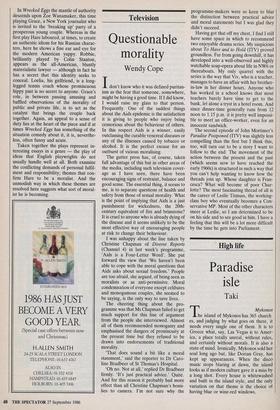Television
Questionable morality
Wendy Cope
Idon't know who it was defined puritan- ism as the fear that someone, somewhere, might be having a good time. If I did know, I would raise my glass to that person. Frequently. One of the saddest things about the Aids epidemic is the satisfaction it is giving to people who enjoy being censorious about the behaviour of others. In this respect Aids is a winner, easily outclassing the curable venereal diseases or any of the illnesses caused by tobacco or alcohol. It is the perfect excuse for an outburst of vicious moralising.
The gutter press has, of course, taken full advantage of this but in other areas of the media, including such television cover- age as I have seen, there have been encouraging signs of restraint, balance and good sense. The essential thing, it seems to me, is to separate questions of health and safety from those of sexual morality. What is the point of implying that Aids is a just punishment for wickedness, the 20th- century equivalent of fire and brimstone? It is cruel to anyone who is already dying of the disease and it seems unlikely to be the most effective way of encouraging people at risk to change their behaviour.
I was unhappy about the line taken by Christine Chapman of Diverse Reports (Channel 4) in last week's programme, `Aids is a Four-Letter Word'. She put forward the view that 'We haven't been able to cope with the moral questions that Aids asks about sexual freedom.' People are too afraid, she argued, of being seen as moralists or as anti-permissive. Moral condemnation of everyone except celibates and monogamous couples, she seemed to be saying, is the only way to save lives.
The cheering thing about the pro- gramme was that Ms Chapman failed to get much support for this line of argument from the people she interviewed. Almost all of them recommended monogamy and emphasised the dangers of promiscuity at the present time but they refused to be drawn into endorsements of traditional morality.
`That does sound a bit like a moral statement,' said the reporter to Dr Caro- line Bradbeer of St Thomas's Hospital.
'Oh no. Not at all,' replied Dr Bradbeer firmly. 'It's just practical advice.' Quite. And for this reason it probably had more effect than all Christine Chapman's homi- lies to camera. I'm not sure why the programme-makers were so keen to blur the distinction between practical advice and moral statements but I was glad they didn't succeed.
Having got that off my chest, I find I still have some space in which to recommend two enjoyable drama series. My suspicions about To Have and to Hold (ITV) proved groundless. Far from going downhill, it has developed into a well-observed and highly watchable soap-opera about life in NW6 or thereabouts. My only quarrel with the series is the way that Viv, who is a teacher, manages to have an affair with her brother- in-law in her dinner hours. Anyone who has worked in a school knows that most teachers barely have time to get to the bank, let alone a tryst in a hotel room. And since dinner-time generally runs from 12 noon to 1.15 p.m. it is pretty well impossi- ble to meet an office-worker, even for an innocent sandwich.
The second episode of John Mortimer's Paradise Postponed (ITV) was slightly less compelling than the first but I think this, too, will turn out to be a story I want to follow to the end. The movement of the action between the present and the past (which seems now to have reached the early 1960s) is structured in such a way that you can't help wanting to know how the threads join up. Whose daughter is Fran- cesca? What will become of poor Char- lotte? The most fascinating thread of all is the career of Leslie Titmuss, the working- class boy who eventually becomes a Con- servative MP. Most of the other characters sneer at Leslie, so I am determined to be on his side and to see good in him. I have a feeling that this will be a lot more difficult by the time he gets into Parliament.


























































 Previous page
Previous page